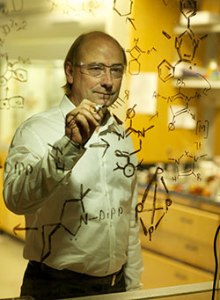Sep 11 2013
Chancellor Pradeep K. Khosla and President Alain Fuchs of the French National Center for Scientific Research (CNRS), the largest governmental research agency in Europe, will meet today to celebrate an agreement to create an international chemical research center on the UC San Diego campus that will aid in the development of new kinds of chemical catalysts for both industry and academe.
 Guy Bertrand
Guy Bertrand
Under the recently signed four-year agreement, UC San Diego will provide $1.5 million to establish the UCSD-CNRS Joint Research Chemistry Laboratory, a research unit in UC San Diego’s Division of Physical Sciences’ department of chemistry and biochemistry. CNRS will supplement the facility with additional funds each year, as well as pay for the salaries of French researchers working at the laboratory.
The formal agreement is one of more than 35 international partnership agreements that have been signed since Chancellor Khosla last August came to UC San Diego and urged faculty and other campus leaders to expand their collaborations around the world to assure educational and research programs on the campus would remain competitive in our increasingly global economy.
“Universities around the world are recognizing the growing need for innovative collaborations and increased internationalization of their programs,” said Chancellor Khosla. “Our partnerships are essential to UC San Diego’s standing as a leader in teaching and research. For students, it’s essential that they become global citizens, for their future and for our world.”
The latest agreement will expand the research of Guy Bertrand, a distinguished professor of chemistry and biochemistry and world leader in the development of organic catalysts, who will direct the UCSD-CNRS Joint Research Chemistry Laboratory. He came to UC San Diego from UC Riverside last year after spending decades in France directing chemical research laboratories and institutes. “The use of purely organic compounds as catalysts will eliminate the major drawbacks of transition-metal-catalysis technology, which are the excessive cost of metal complexes and in many cases the toxicity of the metal,” he explained.
In addition to signing the agreement with Chancellor Khosla, Fuchs and his delegation are scheduled tonight to bestow France’s Legion of Honour on Bertrand. The award, which will be given at a campus ceremony before Bertrand’s colleagues, is the highest national decoration in France, a distinction that recognizes eminent personalities who have contributed significantly to the development of relationships with France.
“I and the rest of the faculty will be on hand tonight to personally congratulate Guy for this much deserved honor and welcome President Fuchs and his delegation,” said Mark Thiemens, a professor of chemistry and biochemistry and dean of the Division of Physical Sciences. “Having worked with scientists from the CNRS, I am very familiar with its longstanding excellence. We’re looking forward to many years of fruitful collaboration with the French chemists on the joint laboratory, which I anticipate will lead to many major discoveries in the field of organic chemistry.”